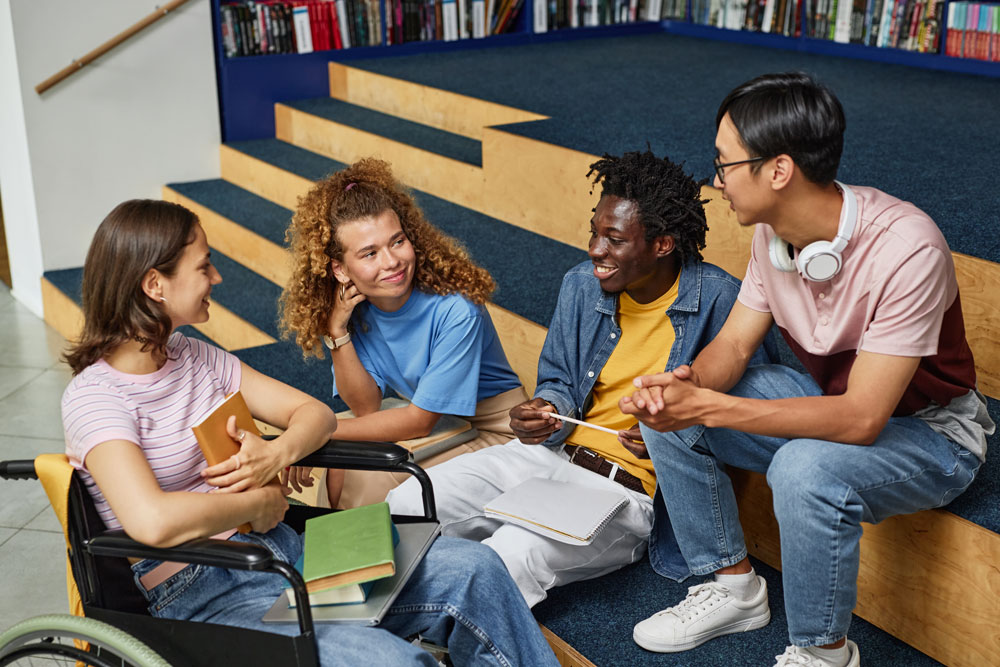Starting college is an exciting transition in the lives of disabled and non-disabled young adults alike.
Yet, a 2025 report by the National Disability Center for Student Success found that “the disabled student experience on campus is very different from the non-disabled student experience. Disabled students are less socially engaged, struggle with daily barriers, perceive their campus differently, feel isolated and misunderstood—and some decide to transfer or drop out as a result.”
To better serve students with disabilities, some students and administrators have created disabled student unions.
At Loyola Marymount University in Los Angeles, the disabled student union recently re-opened after an 18-month closure. That’s thanks to Saturday Rojas, a sociology major and president of the DSU. Rojas told her student newspaper, the Los Angeles Loyolan why the DSU matters.
“The main focus and importance of the DSU, at least as of right now, is that social aspect, and just being able to bring people together, or helping bridge the gap between the individual and the overall community. Instead of just focusing on academics and how to work with your disability to succeed and whatnot, [DSU] actually lets you find other people that you can get along with.”
On the East Coast, New York University’s DSU is a club “that advocates for students with both visible and invisible disabilities.”
When Emely Recinos first arrived at NYU, she struggled with feelings of isolation and frustration.
“I thought I was the only student facing accessibility issues on campus, says Recinos, who is now DSU co-president. “Becoming part of DSU gave me a space to share my feelings and find the social support I was looking for.”
American University in Washington D.C. also has an active DSU. It began after the COVID-19 pandemic, when students—especially those with chronic medical issues—felt more vulnerable and isolated than ever.
As Izzy Scholes-Young, a student at AU explained in her school newspaper, The Eagle, “the primary goal for me has just been creating a space where people can talk about their experiences with disability and helping other disabled people find each other, because that’s really, really difficult.”
In addition to providing safe spaces and social opportunities for people with disabilities and their allies, most DSUs also work to increase awareness of disability issues and campus accessibility. A 2021 article in Inside Higher Ed quoted AU student Katherine Greenstein, then a member of the university’s DSU.
Said Greenstein: “On American University’s campus, disabled students struggle with uneven, impassable sidewalks; a lack of COVID-19 testing protocols; delayed responses from the accommodations office; and classrooms in buildings that are not wheelchair accessible.” According to Inside Higher Ed, AU administrators acknowledged that on-campus accessibility is “a work in progress.”
During the COVID-19 pandemic, UCLA’s DSU collaborated with other campus organizations to create “a petition requesting that all in-person lectures be live-streamed, giving students the option to attend in person or watch online. The petition also sought to eliminate mandated in-person attendance for students and teaching assistants, and to provide recordings of classes for students with COVID-19 or with a modified attendance accommodation.” As of press time, the petition [had received] over 28,000 signatures.”
DSUs also sponsor relevant programming. Programs include film festivals, parties, panel discussions and “hangouts.”
At NYU, students with disabilities had questions about studying abroad. So, the university’s DSU presented “Abilities Abroad: Adventures for Everyone,” an annual event to address their concerns.
“During this event, students with disabilities talk about the challenges they encountered while studying in a different country and how they ultimately overcame them, said co-president Christina Beck. “It’s a great way for students to ask specific questions related to their disability.”


